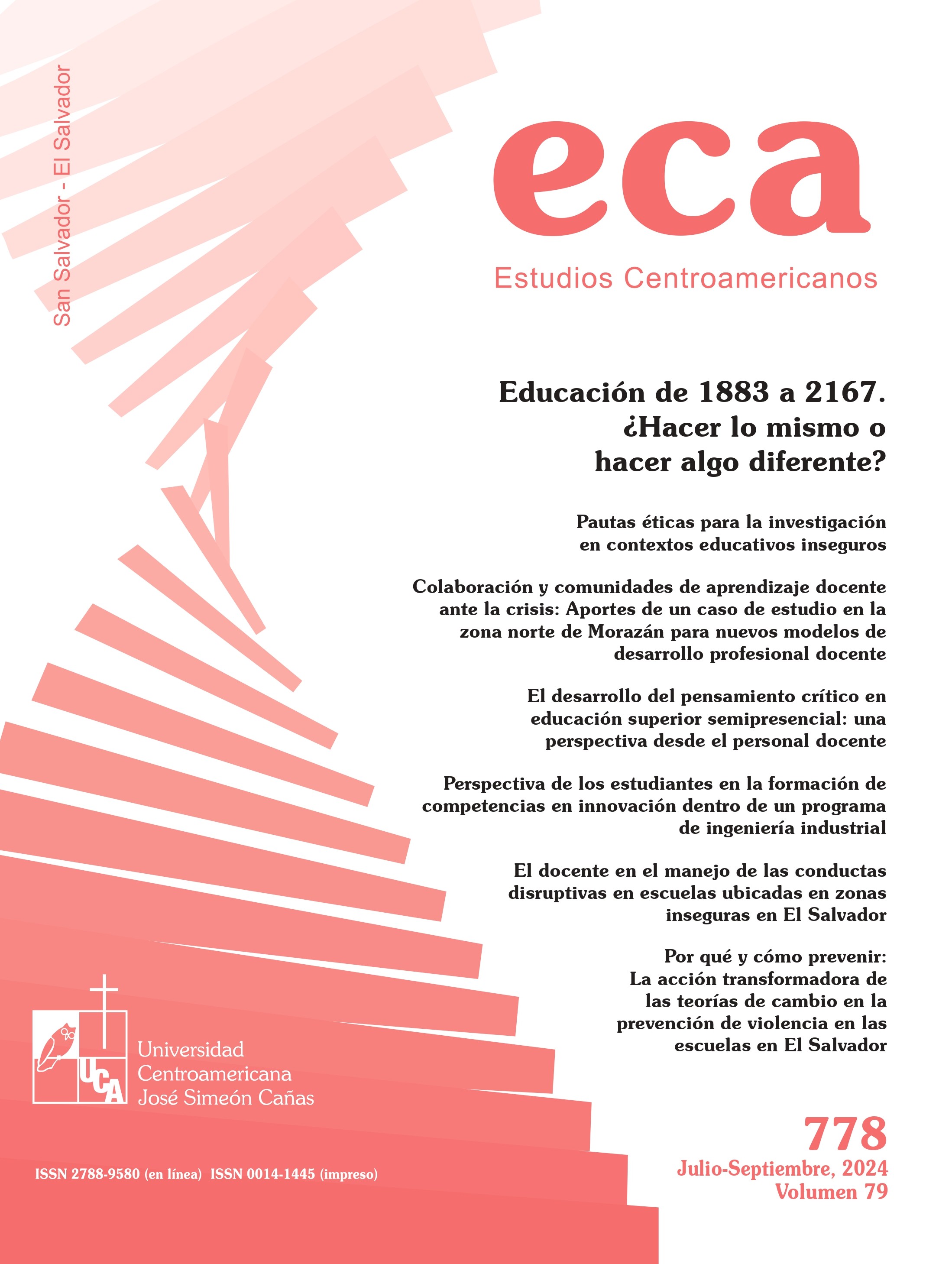Abstract
In any circumstance, investigating educational phenomena is a complex challenge, because educational sciences comprise multiple disciplines (Erdoğan, 2021) and, therefore, multiple ontological and methodological perspectives. Additionally, the field of education policy is oriented towards understanding and solving global problems (Harwell, 2011), rather than pursuing explanatory paradigms to understand local problems (Tedesco, 1986). Therefore, the complexity becomes more entangled in school contexts of marginalization and insecurity when understanding relationships and interactions means personal risks for participants and researchers, as well as difficulties in obtaining reliable data. In research, decisions about design and methodological options are key; however, ethical considerations become essential to contribute to the scientific nature. Common ethics call for confidentiality and informed consent to “do no harm,” but these are not sufficient guidelines for research in educational situations of insecurity and marginalization. Based on a five-year research program in public schools in unsafe contexts, this article will point out the ethical guidelines necessary to protect the dignity and safety of people, as well as achieve quality data. The findings point to mutual benefit, obtaining an accurate reflection of reality, considering personal and emotional safety, and generating trust. With these findings, this article contributes to the field of educational research, with ethical guidelines to protect dignity in contexts of insecurity and achieve reliable data, emphasizing relationships as key.
References
Agencia de los Estados Unidos para el Desarrollo Internacional El Salvador. (2017). Mid-term Performance Evaluation for Education for Children and Youth Activity 2011-2017. USAID.
Beronius, M. (1991). Genealogía y sociología. Nietzsche, Foucault y el análisis social. Editorial Symposium AB.
British Educational Research Association. (2018). Ethical Guidelines for Educational Research (4.ª ed.). BERA. https://www.bera.ac.uk/publication/ethical-guidelines-for-educational-research-2018
Christians, C. (2012). La ética y la política en la investigación educativa. En M. K. Denzin y Y. S. Lincoln (Eds.), El campo de la investigación cualitativa. Manual de investigación cualitativa, Módulo 1. Editorial Gedisa.
Consejo Nacional de Educación. (2016). Plan El Salvador Educado. Por el derecho a una educación de calidad. Consejo Nacional de Educación.
Dewey, J. (1933). How We Think: A Restatement of the Relation of Reflective Thinking to the Educative Process. Heath & Co. Publishers.
Edwards, D. B., Martin, P. y Flores, I. (2017). Education in El Salvador: Past, present, prospects. En C. M. M. Posner (Ed.), Education in México, Central America and the Latin Caribbean (pp. 141-168). Bloomsbury Academic.
Edwards, D. B. (2018). Global Education Policy, Impact Evaluations, and Alternatives. Springer International Publishing. https://www.perlego.com/book/3495070/global-education-policy-impact-evaluations-and-alternatives-the-political-economy-of-knowledge-production-pdf.
Edwards, D. B., Moschetti, M., Martin, P. y Morales-Ulloa, R. (2024). Education and Development in Central America and the Latin Caribbean. Global Forces and Local Responses. Bristol University Press.
Erdoğan, İ. (2021). Educational Science. From Past to Present. HAYEF: Journal of Education, 18(1), 2-20. https://hayefjournal.org/en/educational-science-from-past-topresent-16715
Grosfoguel, R. (2016). Del “extractivismo económico” al “extractivismo epistémico” y “extractivismo ontológico”: una forma destructiva de conocer, ser y estar en el mundo. Tabula Rasa, (24), 123-143. https://www.revistatabularasa.org/numero-24/06grosfoguel.pdf
Harwell, M. (2011). Research Design: Qualitative, Quantitative, and Mixed Methods. Pursuing Ideas as the Keystone of Exemplary Inquiry. En C. Conrad y R. Serlin (Eds.), The Sage Handbook for Research in Education: Pursuing Ideas as the Keystone of Exemplary Inquiry. SAGE Publications.
Instituto Universitario de Opinión Pública. (2019). Entender el hoy para pensar en el mañana. Expectativas ciudadanas sobre la economía, la salud, la educación, la seguridad y la justicia. Instituto Universitario de Opinión Pública/Seattle International Foundation.
La Prensa Gráfica. (2014, 5 de marzo). Imparable acoso de pandilleros a las escuelas. La Prensa Gráfica. https://www.laprensagrafica.com/elsalvador/Imparable-acoso-de-pandilleros-a-lasescuelas-20140305-0085.html
Labaree, D. (2003). The Peculiar Problems of Preparing Educational Researchers. Educational Researcher, 32(4), 13-22. https://doi.org/10.3102/0013189X032004013
Lahman, M. K. (2017). Ethics in Social Science Research. SAGE Publications.
Ministerio de Educación. (2018). Observatorio MINED 2018 sobre los centros educativos públicos y privados subvencionados de El Salvador. Ministerio de Educación.
National Committee for Research Ethics in the Social Sciences and the Humanities. (2022, 26 de mayo). Guidelines for Research Ethics in The Social Sciences and The Humanities. https://www.forskningsetikk.no/globalassets/dokumenter/4-publikasjoner-som-pdf/nesh-guidelines-en-2024/
Novelli, M. y Lopes Cardozo, M. T. A. (2008). Conflict, Education and the Global South: New Critical Directions. International Journal of Educational Development, 28(4), 473-488. https://doi.org/10.1016/j.ijedudev.2008.01.004
Programa de las Naciones Unidas para el Desarrollo. (2013). Informe sobre desarrollo humano El Salvador 2013. PNUD.
Rodgers, C. (2002). Defining Reflection: Another Look at John Dewey and Reflective Thinking. Teachers College Record, 104(4), 842-866. https://www.canr.msu.edu/bsp/uploads/files/Reading_Resources/Defining_Reflection.pdf
Savenije, W. y Martin, P. (2021). Educación en situaciones de riesgo y conflicto. Las pandillas y los nuevos desafíos para centros educativos y profesores. Universidad Centroamericana José Simeón Cañas.
Savenije, W. y Van der Borgh, C. (2015). San Salvador: Violence and Resilience in Gangland - Coping with the Code of the Street. En K. Koonings y D. Kruijit (Eds.), Violence and Resilience in Latin American Cities (pp. 90-107). Zed Press.
Savenije, W., Martin, P. y Cabrera, A. (2022). Teachers, Schools and Communities: Strengthening Safe Spaces. Towards a Framework for School-based Prevention. Research Report. Universidad Centroamericana José Simeón Cañas.
Savenije, W., Martin, P., Cabrera, A. y Molina, S. (2022). Marco de intervención para la prevención en escuelas públicas. Fortalecer espacios seguros. Acompañar a la Educación Básica en contextos de inseguridad. Universidad Centroamericana José Simeón Cañas.
Sayer, A. (2010). Method in Social Science. A Realist Approach. Routledge.
Schön, D. (1983). El profesional reflexivo. Cómo piensan los profesionales cuando actúan. Paidós.
Tedesco, J. C. (1986, 7 de agosto). Los paradigmas de la investigación educativa. Revista Colombiana de Educación, 18. https://revistas.upn.edu.co/index.php/RCE/article/view/5152
U.S. Agency for International Development. (2016). Rapid Education Risk Analysis El Salvador. Final Report. USAID/ECCN.
Villarroel, G. (2023, 17 de mayo). Asamblea aprueba 14.a prórroga al régimen de excepción. La Prensa Gráfica. https://www.laprensagrafica.com/elsalvador/Asamblea-aprueba-14.-prorroga-alregimen-de-excepcion-20230516-0108.html
Yin, R. (2003). Case Study Research. Design and Methods. Sage Publications.

This work is licensed under a Creative Commons Attribution-NonCommercial-NoDerivatives 4.0 International License.
Copyright (c) 2025 ECA. Estudios Centroamericanos






